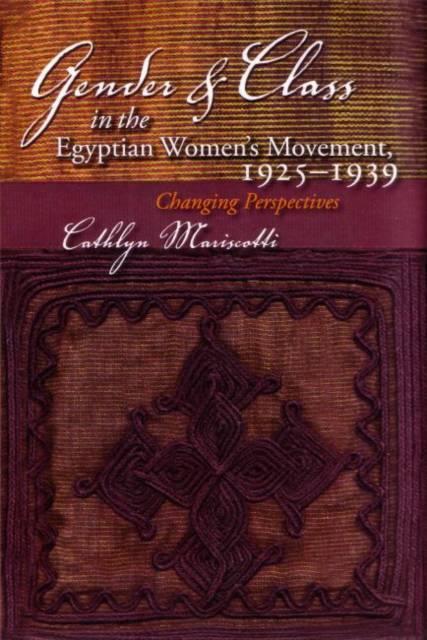
Door een staking bij bpost kan je online bestelling op dit moment iets langer onderweg zijn dan voorzien. Dringend iets nodig? Onze winkels ontvangen jou met open armen!
- Afhalen na 1 uur in een winkel met voorraad
- Gratis thuislevering in België vanaf € 30
- Ruim aanbod met 7 miljoen producten
Door een staking bij bpost kan je online bestelling op dit moment iets langer onderweg zijn dan voorzien. Dringend iets nodig? Onze winkels ontvangen jou met open armen!
- Afhalen na 1 uur in een winkel met voorraad
- Gratis thuislevering in België vanaf € 30
- Ruim aanbod met 7 miljoen producten
Zoeken
Gender and Class in the Egyptian Women's Movement, 1925-1939
Changing Perspectives
Cathlyn Mariscotti
€ 42,45
+ 84 punten
Omschrijving
The women's movement in Egypt has been heralded as improving the lives of women in Egypt and paving the way for women throughout the Arab world. As seen through the eyes of the university educated elite and middle class, this is no doubt true, yet such a narrow view fails to account for the diversity of women's experience. In Changing Perspectives, Cathlyn Mariscotti provides a critical re-examination of the women's movement, framing it within the broader economic and political movements occurring in Egypt and abroad. Her nuanced account unveils a rich, differentiated, and complex history of Egyptian women.
Drawing upon published journal reports and newspaper articles, Mariscotti explores the tensions between upper class harem women and lower class women. Rather than a unified movement, the author describes the way in which elite feminism created a concept of womanhood that fed into the nationalist cultural ideal, one that was not necessarily progressive for all Egyptian women. Demonstrating active resistance, the non-elite women constructed a model of feminism in line with their own class position and political interests. Mariscotti's reveals the tension in the movement through the profiles of From this class struggle, a unique, synthesized form of feminism emerged, infused with the politics and culture of Egypt at that time. Humanizing her analysis, the author profiles two outspoken and prominent women who symbolize the conflict: the university educated and wealthy Huda Sha'rawi and Munira Thabit who represented the working class women. The first book to emphasize the class conflict among women, this book makes an invaluable contribution to the fields of women's studies and Middle East studies.Specificaties
Betrokkenen
- Auteur(s):
- Uitgeverij:
Inhoud
- Aantal bladzijden:
- 204
- Taal:
- Engels
- Reeks:
Eigenschappen
- Productcode (EAN):
- 9780815631705
- Verschijningsdatum:
- 31/10/2008
- Uitvoering:
- Hardcover
- Formaat:
- Genaaid
- Afmetingen:
- 160 mm x 234 mm
- Gewicht:
- 430 g

Alleen bij Standaard Boekhandel
+ 84 punten op je klantenkaart van Standaard Boekhandel
Beoordelingen
We publiceren alleen reviews die voldoen aan de voorwaarden voor reviews. Bekijk onze voorwaarden voor reviews.











